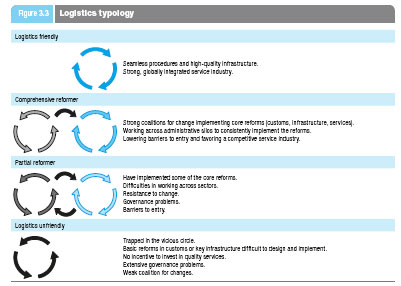Logistics Index Criteria
The LPI is a composite of a country’s rating across seven different attributes:
- Customs Clearance
- Logistics Infrastructure
- Ease of International Shipments
- Logistics Competence/Internal Skills Sets and Service Providers
- Tracking and Tracing Capabilities
- Domestic Logistics Costs
- Timeliness/Consistency
The seven attributes were assigned somewhat different levels of significance, and a weighted average approach was used to calculate the final LPI score.
Singapore Tops the Rankings
The city-nation of Singapore was rated the top country in terms of total logistics performance. The top ten countries in total LPI score were as follows:
Top 10 Countries in Logistics Performance
- Singapore
- Netherlands
- Germany
- Sweden
- Austria
- Japan
- Switzerland
- Hong Kong/China
- United Kingdom
- Canada
For a downloadable graphic of the full 150 country rankings, go to: Logistics Performance Index Rankings by Country. (You will probably need to expand your browser display using the magnifying glass function to see the image properly).
The United States ranked 14th. Perhaps surprising, given the concern over the logistics and transportation infrastructure in the US, the US was rated as the seventh best country on that attribute, but faired lower on other dimensions.
“The concern over logistics infrastructure is not so much about the present but about the investment for the future,” noted SCDigest Contributing Editor Gene Tyndall.
By category in the Index, the US ratings were as follows, out of 150 countries in the study:
- Customs - 19th
- Infrastructure - 7th
- International shipments - 20th
- Logistics Competence - 13th
- Tracking and Tracing - 10th
- Domestics Logistics Costs - 144
- Timeliness - 19th
Consistency and Predictability are Critical
The report wisely notes that at least as important as a countries cost of logistics and its overall capabilities is the consistency and predictability companies can expect moving goods into and out of a given country.
“Reliability (measured by the predictability of the clearance process and the timely delivery of shipments) emerged as a key concern, with the difference in satisfaction between the high and low performing countries much larger than for any other question in the survey,” the report states.
The report notes the high “induced costs” that companies must bear beyond direct logistics costs if supply chain processes cannot be executed with consistency in a country. Companies might have to “hedge” against this variability, for example, by carrying extra inventory, or incurring premium transportation expense to respond to unexpected delays.
The impact is clear, the report states: “Induced costs are inversely related to predictability and also tend to rise steeply with declining logistics performance. For example, suppliers to the same automobile manufacturer will carry 7 days of inventory in Italy but 35 days in Morocco. Some retailers in African countries maintain three months of inventories or more.”
Call to Action
The report notes the vast differences between countries in their attitudes towards logistics improvement. Leaders are “logistics friendly,” while at the other end are “logistics unfriendly” countries that are caught in a vicious circle that presents huge barriers to reform. Many other countries fall in the middle of these two extremes, but must make major commitments to reach better levels of performance (see illustration below).

In a concluding note, the report says that, “The LPI rankings and indicators provide robust benchmarks that may help policymakers - and particularly the private sector - to build the case for reform. By showing countries how they compare with their competitors and shining a light on the costs of poor logistics performance, it is hoped that the LPI and its indicators may help countries break out of the vicious circle of logistics unfriendliness.”
Do you agree with the World Bank report country rankings? What would you change? Does the US at 14th show the need for more investment and improvement? How would you improve this Index? Let us know your thoughts at the Feedback button below.
|